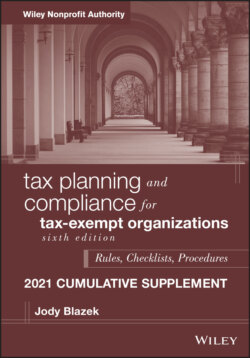Читать книгу Tax Planning and Compliance for Tax-Exempt Organizations - Jody Blazek - Страница 20
Conclusion
ОглавлениеYou do not qualify for recognition of exemption under IRC Section 501(c)(3) because you fail the operational test. You operate for the private benefit of your vendors by providing them with a forum to sell their products to the public. This is a substantial nonexempt purpose, which precludes you from exemption under Section 501(c)(3).
p. 37. Add new numbered entry:
7. Trust created by a college graduating class to provide aid to disabled or destitute members and scholarships was found to benefit private individuals rather than exclusively public interests. The IRS quoted regulations that say an “exempt organization must serve a public interest and the organization must establish that it is not operated for the benefit of designated individuals. The rule that a charitable organization must not serve private interests other than incidentally is a long‐established one.”2
p. 37. Add to footnote 51.
Priv. Ltr. Rul. 202021025 in which members of Z ethnicity group met monthly to promote friendship, cooperation, and mutual assistance to members on occasions of grief, approved of the celebrations as well as the program to provide financial assistance from members' deposits.
p. 41. Add after partial paragraph at top of page:Keep in mind, to achieve recognition of tax exemption, the organization must be created to achieve one of the charitable purposes set out in IRC § 501(c)(3), listed in § 2.1(d). A single nonexempt purpose, if substantial, will preclude tax exemption under IRC § 501(c)(3). Then study the facts in the next example of an entity that failed to get positive recognition.3
The purpose in your Articles of Incorporation states “to promote friendship, cooperation and mutual assistance among your members. Because your Articles of Incorporation do not limit your purposes to those described in Treas. Reg. § 1.501(c)(3)‐1(b)(1)(i), you fail the organizational test in IRC § 501(c)(3).
You do not meet the provisions of Treas. Reg. § 1.501(c)(3)‐1(c)(1). You are operated to provide direct economic benefits to members. For example, you provide financial assistance to members for such things as buying a home, funeral expenses, and birth of a member's child. This serves a substantial nonexempt private purpose, which precludes exemption under IRC § 501(c)(3).
You are not described in Treas. Reg. § 1.501(c)(3)‐1(d)(1)(ii) because you are operating for the private interests of your members. This is evidenced by the fact you are operated to provide financial assistance to members.
You are similar to the organization described in Revenue Ruling 67‐367. Like that organization, your activities serve to benefit your members and their families rather than benefit the public. For instance, when a member or one of their family members dies, you help cover the costs of the funeral. When a member wishes to buy a home, you provide financial aid. There is no charitable intent to the payments or qualification or review to determine need because the payments are automatic. The payment of these types of benefits to pre‐selected, specifically named individuals serves a private interest rather than a public interest which preludes exemption under IRC Section 501(c)(3).
The group of parents in Revenue Ruling 69‐175 provided a cooperative service for themselves and thus served their own private interests. Like that organization, you were formed to provide benefits to your members. In your case, you are primarily providing financial assistance for the funeral expenses of members and their families as well as providing benefits for other occasions such as buying a home or the birth of a child. The payments serve a private rather than a public interest which precludes exemption under IRC § 501(c)(3).4
